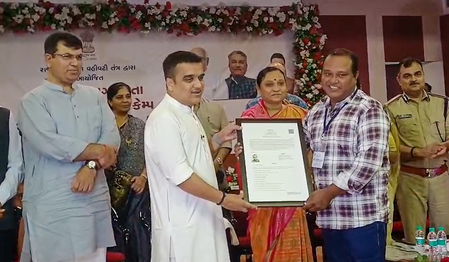
Rajkot (Gujarat), July 25 (IANS) In a significant development under the Citizenship Amendment Act (CAA), 185 individuals who migrated from Pakistan were granted Indian citizenship in a special certificate distribution programme held at Atmiya College, Rajkot on Friday.
Gujarat Home Minister Harsh Sanghvi handed over the citizenship certificates, marking a moment of joy and relief for families who had long awaited recognition in their new homeland.
In his remarks on the occasion, he emphasised the emotional and social impact of the decision.
“We have granted Indian citizenship to 185 people today. Many of these families lived in fear and faced serious hardships in Pakistan. They told me their daughters were afraid to even attend school. The law and order situation for minorities there is deeply troubling,” Sanghvi said.
He further credited Prime Minister Narendra Modi and the Citizenship Amendment Act for making the transition possible.
“Thanks to the CAA, thousands of dreams are being fulfilled. People who faced persecution for their faith—Hindus, Sikhs, Christians, and Buddhists—now have a chance to live with dignity in India. I feel proud and thankful to PM Modi for making this a reality.”
Beneficiaries Laxmiben and Labh Hurbai, both of whom migrated from Pakistan years ago, shared their heartfelt experiences.
“I came from Pakistan in 2011 and have waited many years for this day,” said Laxmiben. “It feels good to finally be recognised as an Indian citizen. Life here is better and safer than it was in Pakistan. Many of my relatives are still there and they too want to return to India.”
Labh Hurbai, who came to India in 2015, echoed similar sentiments.
“There is a huge difference between living in Pakistan and in India. I’m very happy to be here, and I hope my family members still in Pakistan can also join us.”
The CAA, enacted in 2019, offers a path to Indian citizenship for non-Muslim religious minorities from Pakistan, Afghanistan, and Bangladesh who arrived in India before December 31, 2014. Though it remains a subject of political debate and protest, especially over concerns of religious discrimination, the law has opened doors for many refugees seeking safety and stability.
The process for applying for citizenship under CAA is governed by Section 6B of the Citizenship Act, 1955. Applicants must prove their origin, religion, date of entry, and basic knowledge of an Indian language.
–IANS
jk/vd



